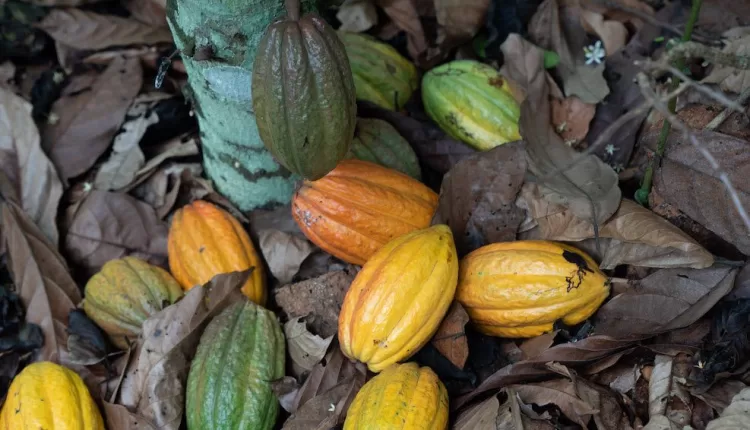There is drama in West Africa as cocoa pods have become the target of thieves eager to cash in on the historic hike in the commodity’s price.
From thieves stealing pods to traders rigging scales — high drama is unfolding in Nigeria and Cameroon’s cocoa markets — as everyone jostles for the massive profits on offer as prices of the chocolate ingredient have soared to their highest in over forty years.
Production shortfalls in West Africa, where much of the world’s cocoa is grown, are driving the rally.
With the heart of the harvest season now underway, the rush of unusual developments highlights the fight over the limited supply and complicates how much farmers ultimately benefit from the price gains.
“Thieves are invading the sector, stealing pods and selling to traders,” Charles Etoundi Ngono, a local delegate of Cameroon’s Trade Ministry, said.
Unlicensed traders have entered the market and are using faulty scales to cheat farmers, he added.
Cocoa futures traded in New York reached a 46-year high last week as heavy rains and crop diseases hurt West African output.
In Ivory Coast and Ghana, the top two nations producing about 60% of the world’s cocoa, industry regulators set the price at which traders buy from farmers.
Cameroon and Nigeria, however, operate in a free market system with minimal state control.
A kilogram of beans in the center and littoral production areas of Cameroon currently fetches $3.30, up 26% from the start of the season in October, according to the Cameroon-based Cocoa and Coffee Interprofessional Board.
A single cocoa pod sells between 200 and 250 francs depending on the size, according to a survey of five farmers in the area.
“We want to take advantage of the rising price before it’s too late,” Jean-Phillipe Amougou, one of the farmers said, in an interview.
Growers in Nigeria are witnessing a similar frenzy for profits. Land owners in the south-eastern part of the country, which account for 30% of the nation’s 285,000-ton annual output, are pushing up rents, sometimes looking for quadruple the current prices.
“My landowner is asking for 450,000 naira per year on the 2-hectare farm for which I currently pay 200,000,” said Attangba Bonjo, who grows cocoa on leased land in Ikom in Nigeria’s southeast.
“Cocoa farmgate prices have risen to about 4 million naira from 2.7 million naira per ton in the last two months, which I believe the land owners want to have a taste of.”
More than a fifth of the 18,000 farmers in the area are impacted by the rent hikes, according to John Kalu, the zone’s coordinator for the Cocoa Association of Nigeria.
The growers will be hurt by this “if cocoa prices were to fall below their current levels.”
However, the skew of the market is not without some benefits for farmers, and they’re making some unusual but potentially lucrative contracts.
Growers in central Cameroon have started selling beans still in pods because they want to lock in the current high prices, Ngono said. Buyers are eager because they want to export more, he added.
In the normal course, farmers cut open the pods with their machetes and let the cocoa beans ferment and dry in the sun for 10-12 days before selling them.
Now, in many new deals, these steps are the buyer’s responsibility. They assess the crop and strike a deal.
In some contracts, the processing is then outsourced back to the farmers, or the buyer might hire workers.
With supplies tight, buying the crop on trees assures traders that a competitor won’t purchase the cocoa ahead of them.
But the volatility concerns Cameroon’s authorities.
The government plans to ban the sale of all cocoa on the market that cannot be traced to stem theft in the business, Trade Minister Luc Magloire Mbarga Atangana said during a recent tour of the country’s so-called centers of excellence that help cocoa farmers process the beans and find the best bidders for their produce.
- Major Ghana Cocoa Region 81% Infected with Bean Disease - July 22, 2024
- Ghana to Delay More Cocoa Deliveries as Supply Crisis Worsens - June 12, 2024
- Cocoa Production Helping Mitigate Climate Change Impact - June 10, 2024
